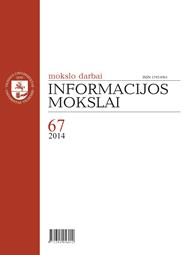Žiniasklaidos laisvės ribojimo aplinkybės Lietuvoje
FACTORS OF LIMITATION OF MEDIA FREEDOM IN LITHUANIA
Author(s): Deimantas JastramskisSubject(s): Media studies
Published by: Vilniaus Universiteto Leidykla
Summary/Abstract: The analysis presented in this article reveals what factors of legal, political and economic environment reduce the media freedom in Lithuania. The Constitution of the Republic of Lithuania stipulates that everyone has a right to hold opinions and freely express those, to obtain and disseminate information, whereas censorship of mass information is prohibited. The right to collect, obtain and publish information is stipulated by laws. However, journalists not always are able to access public records through clear administrative procedures in a timely manner. There are articles determining libel and defamation in the Lithuanian Penal Code (journalists and other citizens can be punished by fines or become imprisoned for up to two years). Although penalties for „irresponsible journalism” are applied only in exceptional cases, libel and defamation articles in the Penal Code stimulate self-censorship of some journalists. There are no special legal acts in Lithuania that would restrict the ownership concentration of the media organisations or the parts of the market that they occupy. Due to insufficient restriction on the property concentration in media, the legal environment (in relation to the independent media variety) is not assessed as very favourable. In Lithuania some editorial office owners (as well as editors) may support some political forces and consequently, the media administered by them disseminate quite biased political content. This is very obvious in the regional municipalities, where a large part of the local media is financially dependent on politicians and the main shareholders of the local media are also politicians. In connection to the political-financial influence on editorial offices self-censorship of journalists is a part of daily routine in some media organizations. There is an excessive concentration of media ownership in the hands of private interests that can be linked to the powerful societal actors. Highly concentrated groups that control organizations both in the media market and other fields of economy limit the variety of the media content on the national, regional and local levels. Since the property relations of the Lithuanian media subjects are only partially publicised and internal norms of behaviour and rules of the editorial offices are usually not developed, the management transparency of the media organisations is quite low. The economic pressure on the journalists is huge. Also one of the measures of reducing the journalist social benefits is a widespread practise not to enter into labour or authorship contracts, but rather to force them to work as freelancers on the basis of certificates issued by the State Tax Inspectorate. The analysed legal, political and economic factors of intervention in the media work process shows that the media independence from external actors is not ensured but the situation cannot be assessed as extremely critical from this point of view.
Journal: Informacijos mokslai
- Issue Year: 2014
- Issue No: 67
- Page Range: 120-135
- Page Count: 16
- Language: Lithuanian

